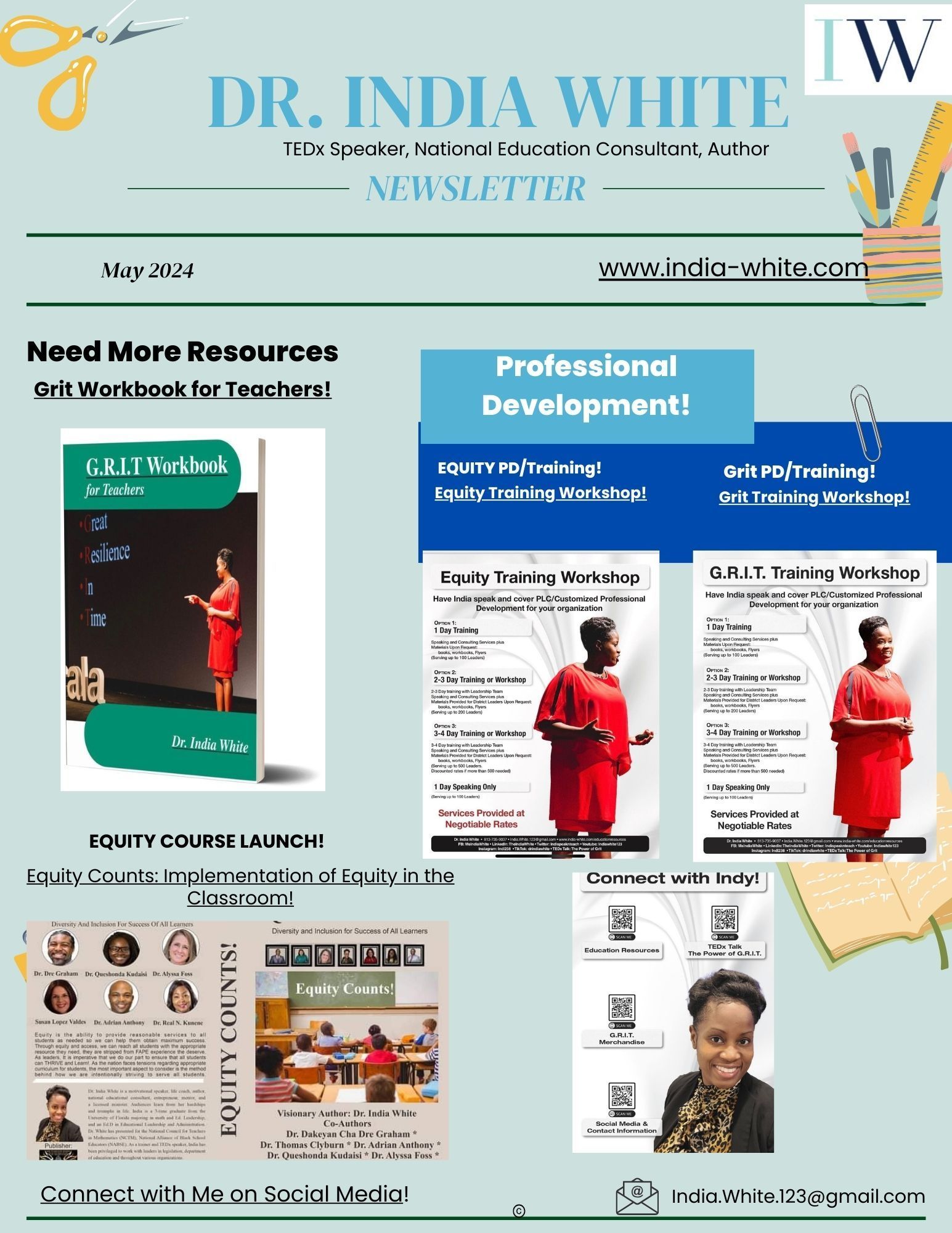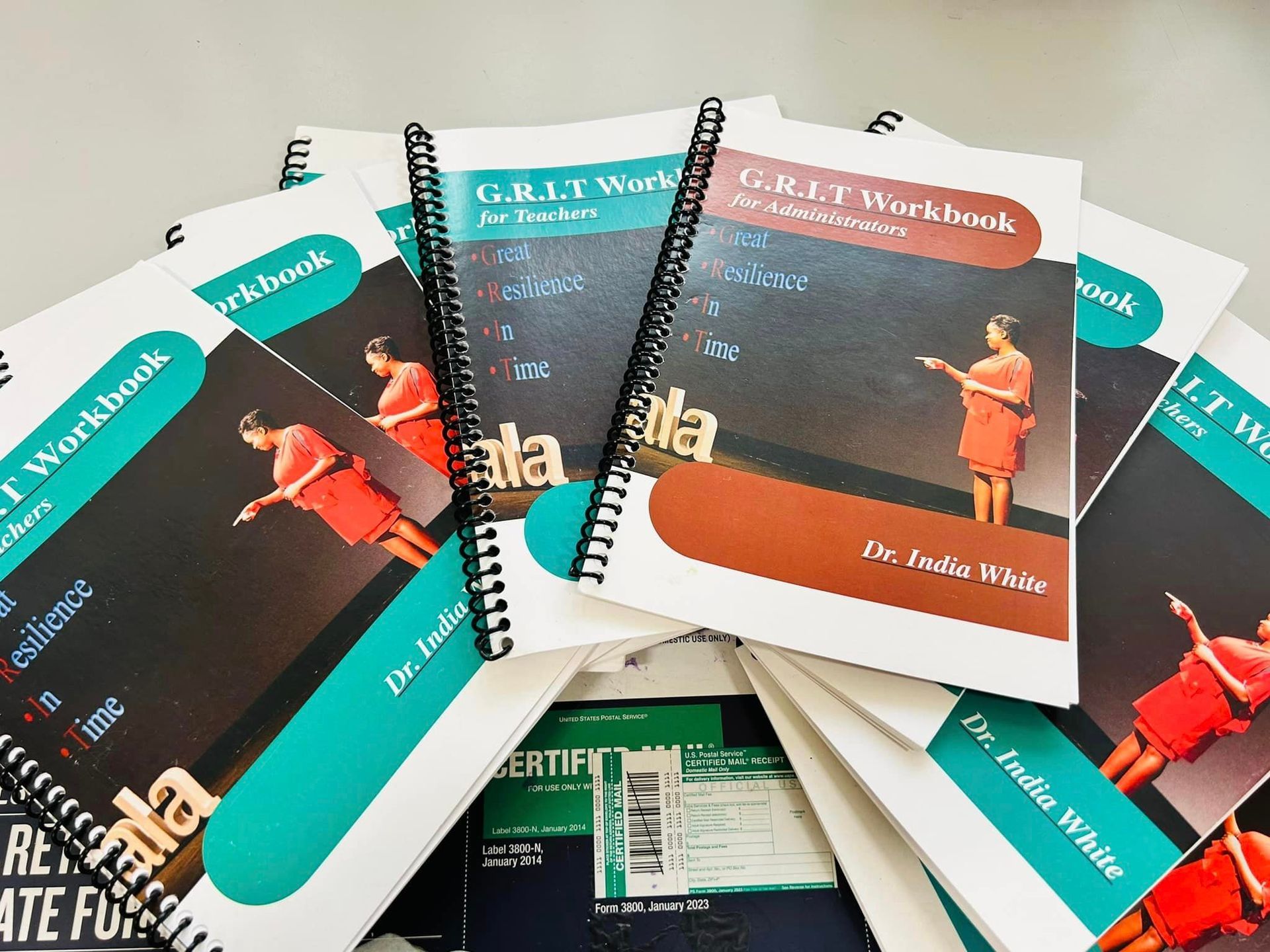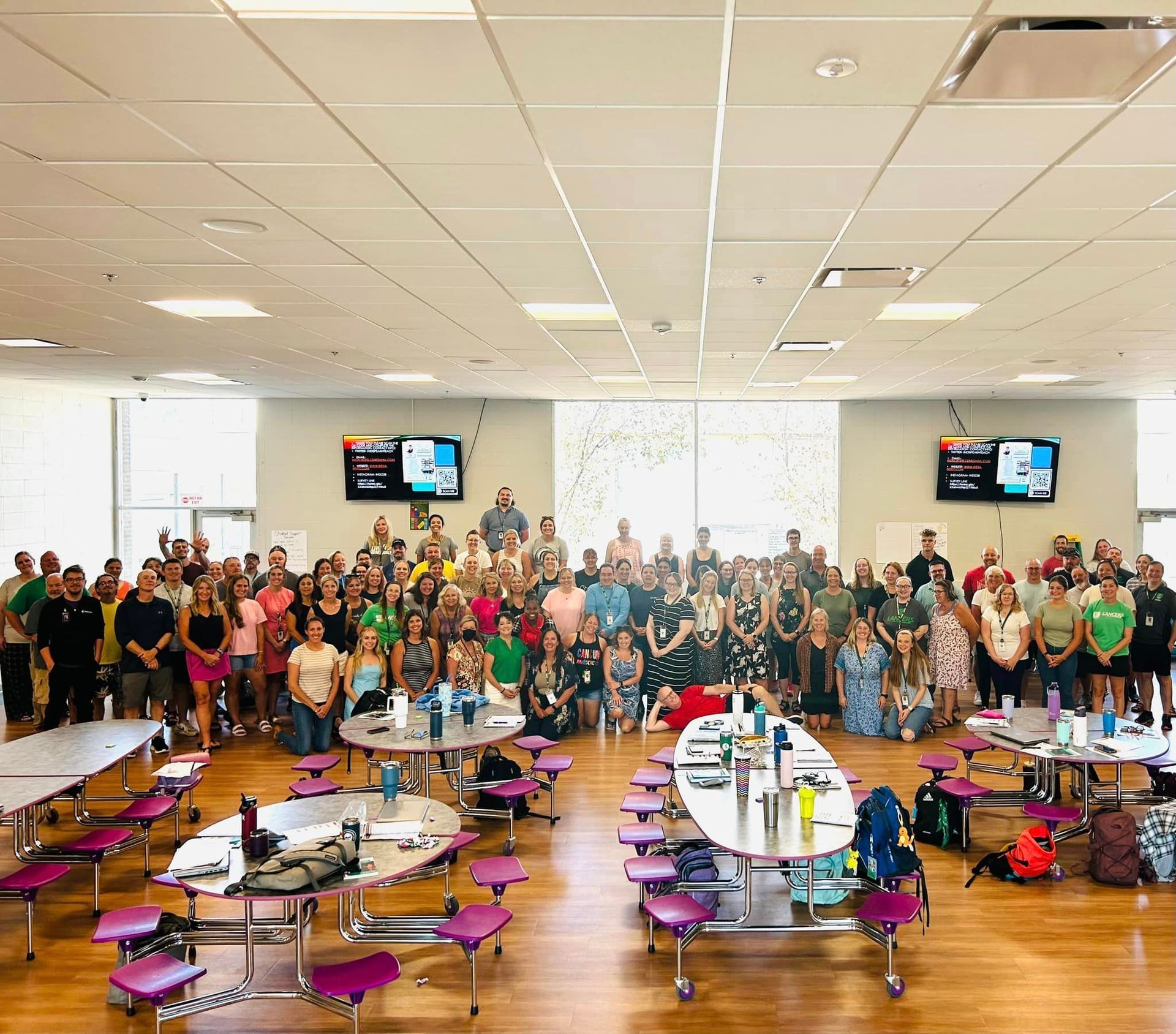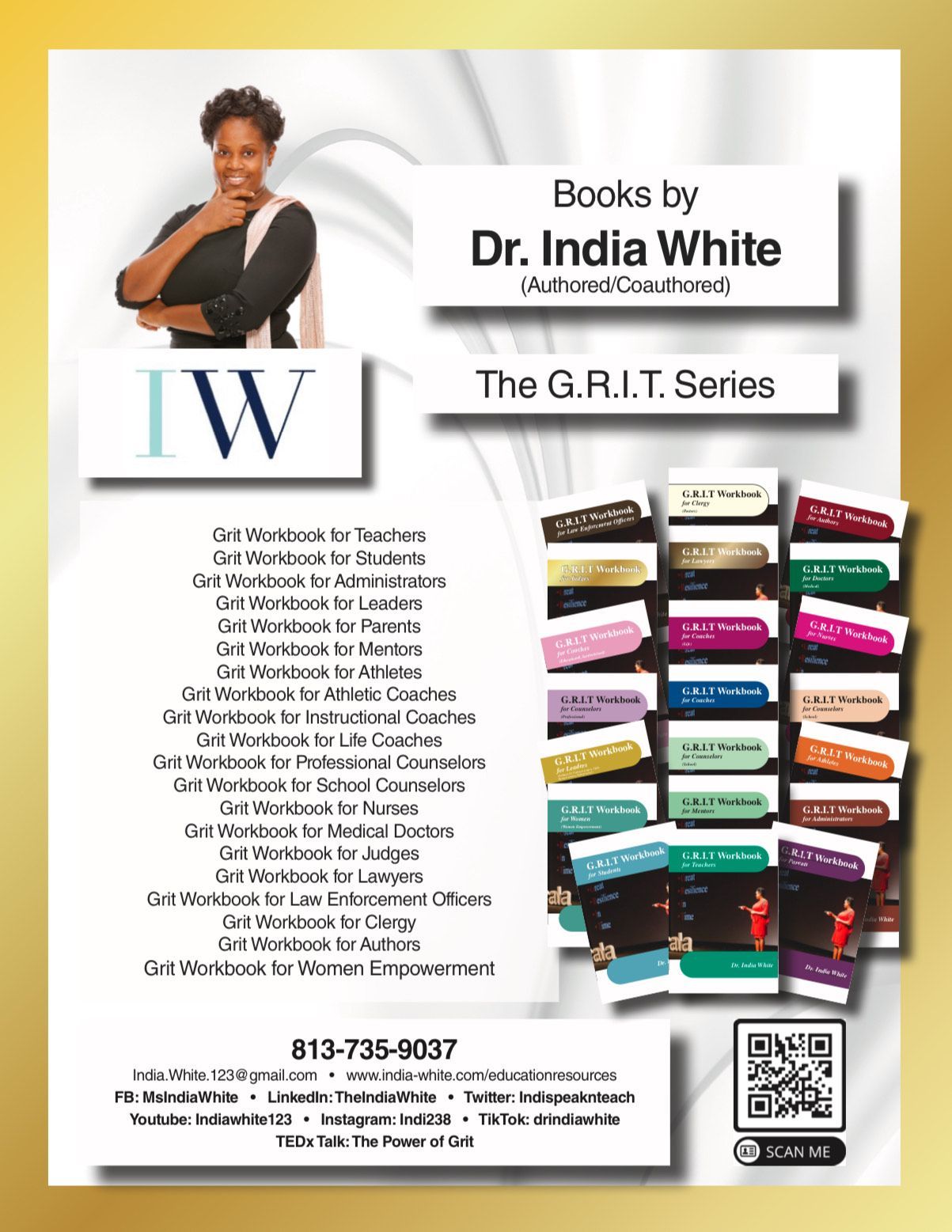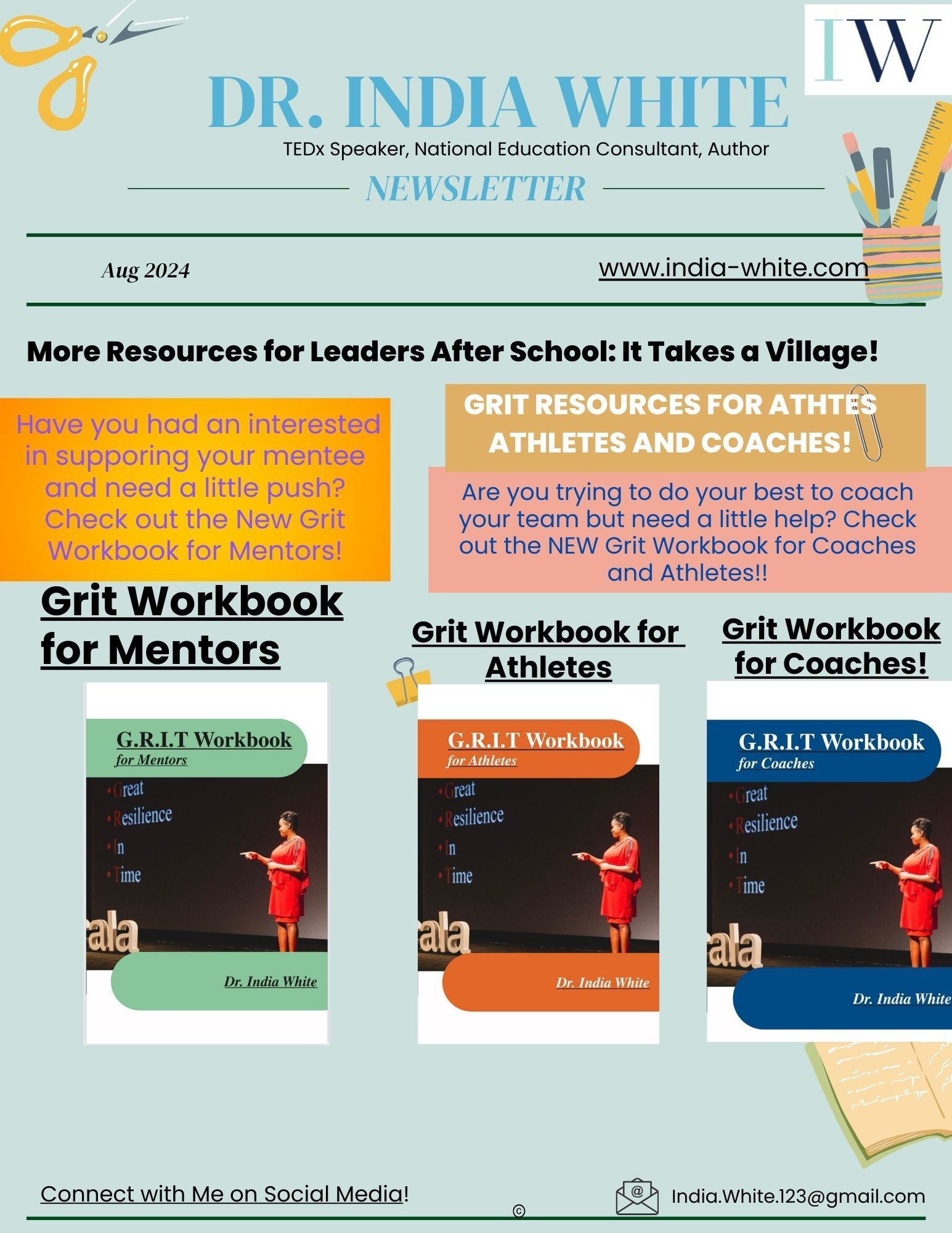How the G.R.I.T. Framework is Aligned with Florida's Resiliency Standards
India White • October 18, 2024
G.R.I.T. Framework Aligned with Fl. Resiliency Standards
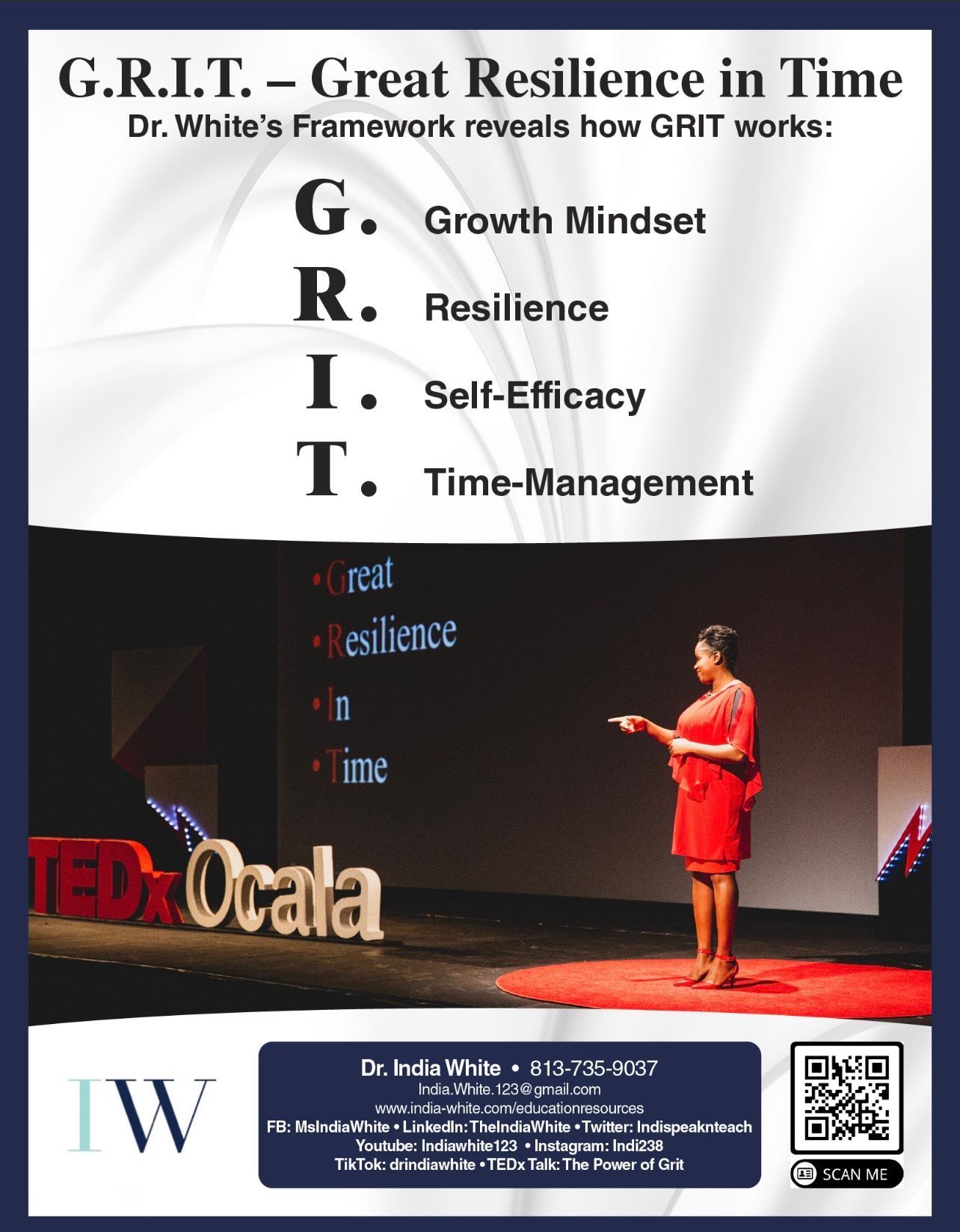
How the G.R.I.T Framework and G.R.I.T. Workbook Align to Florida Resiliency Standards
Dr. India White's GREAT Resilience In Time (G.R.I.T.) Workbook for Teachers, her G.R.I.T. Framework, and her TEDx talk "The Power of Grit" align comprehensively with the Florida Health Standards and the 11 Resiliency Skills outlined in Section 1003.42(2)(n)4., Florida Statutes (F.S.). These standards emphasize essential life skills that build confidence, support mental and emotional health, and enable students to overcome challenges. Here’s a detailed explanation of this alignment:
I. Self-awareness and Self-management
Dr. White's G.R.I.T. Framework includes a self-assessment component that encourages teachers and students to reflect on their resilience, growth mindset, self-efficacy, and time management. This self-awareness is foundational for effective self-management. By understanding their strengths and areas for improvement, individuals can better regulate their emotions and behaviors, aligning with the self-awareness and self-management goals of the standards.
II. Responsible Decision-making
The G.R.I.T. Workbook provides practical exercises and scenarios that help students and teachers make thoughtful and informed decisions. By fostering a growth mindset, Dr. White emphasizes the importance of perseverance and dedication, encouraging responsible decision-making that considers long-term outcomes rather than immediate gratification.
III. Resiliency
Resiliency is a core focus of Dr. White’s G.R.I.T. resources. Her TEDx talk highlights the ability to bounce back from setbacks and maintain a positive outlook in the face of adversity. The workbook includes specific activities to build resilience, such as reflective questions and goal-setting exercises that encourage students to persist through challenges.
IV. Relationship Skills and Conflict Resolution
Dr. White’s emphasis on a growth mindset and understanding diverse perspectives promotes better relationship skills and conflict resolution. By encouraging empathy and open-mindedness, her framework helps students navigate interpersonal conflicts and build stronger, more respectful relationships.
V. Understanding and Respecting Other Viewpoints and Backgrounds
The G.R.I.T. Framework’s focus on a growth mindset also supports the understanding and respect for diverse viewpoints. Dr. White teaches that challenges and failures are opportunities for growth, which includes learning from others' experiences and perspectives.
VI. Developing Leadership and Interpersonal Skills (Grades 9-12)
For high school students, Dr. White’s resources address the development of leadership, interpersonal skills, organization skills, and other critical life skills. Her workbook includes exercises on goal setting, time management, and self-efficacy, which are essential for creating resumes, exploring career pathways, and preparing for employment. These activities align with the standards' focus on preparing students for future careers and responsibilities.
VII. Florida Health Standards Alignment
Dr. White’s G.R.I.T. Framework aligns with the Florida Health Standards, specifically HE.912.R.4.1, which emphasizes the importance of character and grit in achieving successful outcomes. By teaching students to persevere, manage stress, and stay motivated, Dr. White’s resources directly support these educational goals.
VIII. Alignment with 11 Resiliency Skills
Dr. India White’s G.R.I.T. Framework and Workbook are meticulously aligned with the 11 resiliency skills outlined in Florida's educational standards. Each skill is addressed through specific components of the framework, fostering comprehensive personal and professional development.
1. Grit
Dr. White’s G.R.I.T. Framework is fundamentally designed to cultivate grit, defined as the combination of passion and perseverance toward long-term goals. Through her self-assessment tools and reflective exercises, teachers and students are encouraged to identify their core passions and commit to pursuing them persistently. This focus on sustained effort and dedication, even in the face of challenges, embodies the essence of grit, helping individuals to build a strong, resilient character that is essential for success.
2. Resilience
Resilience is explicitly addressed within the resilience category of Dr. White's G.R.I.T. Framework. The workbook includes activities and questions that prompt individuals to reflect on their ability to bounce back from setbacks and adapt to change. By encouraging the practice of maintaining a positive outlook and developing strategies to overcome obstacles, Dr. White’s resources help students and teachers build resilience, ensuring they can recover from difficulties and continue moving forward with determination.
3. Perseverance
Perseverance is a recurring theme in both the growth mindset and resilience components of the G.R.I.T. Framework. Dr. White emphasizes the importance of persistence through failure and challenges, teaching that setbacks are opportunities for growth and learning. Through guided exercises, individuals are encouraged to set long-term goals, develop a plan to achieve them, and remain committed to their efforts despite difficulties. This relentless pursuit of goals is a key aspect of perseverance.
4. Gratitude
Gratitude is fostered through the self-reflection and positive outlook promoted by Dr. White's framework. The workbook encourages individuals to regularly reflect on their progress and appreciate the small victories along their journey. This practice of acknowledging and valuing positive experiences and contributions helps build a mindset of gratitude, which is crucial for maintaining a balanced and positive perspective in both personal and professional life.
5. Responsibility
Responsibility is promoted through the self-efficacy and responsible decision-making exercises within the G.R.I.T. Framework. By guiding individuals to take ownership of their actions, set realistic goals, and make informed decisions, Dr. White’s resources help foster a sense of responsibility. Teachers and students learn to be accountable for their progress and setbacks, understanding that their actions directly impact their success and well-being.
6. Responsible Decision-making
Responsible decision-making is integrated throughout the G.R.I.T. Framework, particularly in scenarios and reflective questions that challenge individuals to consider the consequences of their choices. Dr. White provides practical tools and exercises that help individuals weigh their options, think critically about potential outcomes, and make decisions that align with their long-term goals and values. This emphasis on thoughtful and informed decision-making is crucial for personal and professional growth.
7. Self-awareness
Self-awareness is central to the self-assessment component of the G.R.I.T. Framework. Dr. White encourages individuals to reflect deeply on their strengths, weaknesses, and areas for improvement. This heightened self-awareness allows individuals to understand their motivations, recognize their emotional responses, and make adjustments to their behavior that promote personal growth and effective self-management.
8. Self-management
Self-management is developed through the time management and self-efficacy activities within Dr. White’s framework. By teaching individuals how to prioritize tasks, set realistic goals, and manage their time effectively, the G.R.I.T. Workbook helps them develop the skills needed to regulate their behavior and stay focused on their objectives. These self-management skills are essential for achieving long-term success and maintaining a balanced life.
9. Mentorship
Mentorship is encouraged as part of relationship skills and supporting others within the G.R.I.T. Framework. Dr. White emphasizes the importance of building strong, supportive relationships and seeking guidance from experienced mentors. The workbook includes exercises that prompt individuals to reflect on their role as mentors and mentees, fostering a culture of support, collaboration, and mutual growth.
10. Citizenship
Citizenship is promoted through the emphasis on understanding and respecting diverse viewpoints and backgrounds. Dr. White’s framework teaches individuals to value different perspectives, fostering a sense of community and social responsibility. By encouraging empathy and open-mindedness, the G.R.I.T. Workbook helps students and teachers become active, respectful, and engaged members of their communities.
11. Honesty and Empathy
Honesty and empathy are integral to the relationship skills and conflict resolution components of the G.R.I.T. Framework. Dr. White’s resources teach individuals to communicate openly and honestly, while also understanding and respecting others’ feelings and perspectives. This focus on genuine, empathetic interactions helps build trust, resolve conflicts effectively, and foster healthy, supportive relationships.
In conclusion, Dr. India White’s G.R.I.T. Workbook for Teachers, her G.R.I.T. Framework, and her TEDx talk are meticulously aligned with Florida’s resilience standards. They provide comprehensive strategies to develop essential life skills, fostering a growth mindset and building resilience in both students and teachers, ensuring they are equipped to thrive in various aspects of life.
Looking for more resources? Explore the G.R.I.T. Workbook Series by Dr. India White, featuring workbooks for teachers, students, administrators, parents, and leaders!
Join the G.R.I.T. Academy today for online courses on G.R.I.T. or access personalized tutoring services and support for your students!
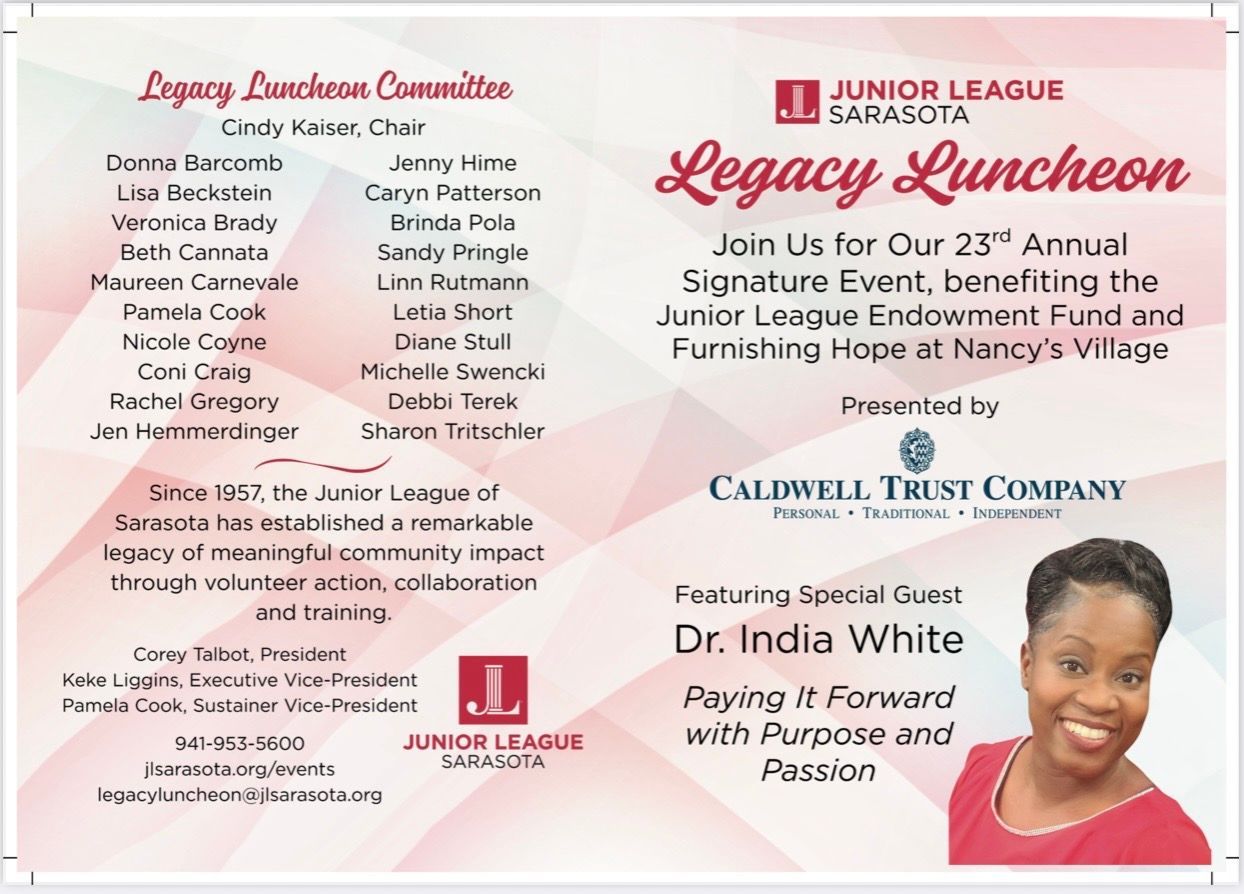
Coming Full Circle: Returning to Sarasota with Gratitude and G.R.I.T. I am filled with gratitude and emotion as I prepare to return to Sarasota; not just as a speaker, but as someone whose life was forever changed by the generosity, vision, and grit of this community. Many years ago, I stood on the other side of opportunity as a formerly homeless teen, supported by scholarships made possible by leaders and organizations—many of whom will be in the room when I return. Those investments were not just financial; they were votes of confidence. They said, “We see you. We believe in your future.” And that belief changed everything. To now come back and say thank you; not in words alone, but through purpose-driven work—is truly humbling. Honoring a Legacy of Advocacy and Impact This moment is especially meaningful as we continue the legacy of Rep. Detert, a tireless advocate for students, education, and formerly homeless youth like myself. Her leadership embodied what it means to pair policy with compassion and action with accountability. She didn’t just talk about equity—she fought for it. That legacy lives on in the leaders, educators, and community members who refuse to let circumstance define a child’s future. The G.R.I.T. of This Organization What stands out most about this organization and its leaders is their impeccable G.R.I.T.**—growth mindset, resilience, self-efficacy, and time invested wisely in people. This is not performative work. This is long-haul, legacy-building leadership. You don’t just open doors—you walk alongside young people until they’re strong enough to run through them. A Personal Thank You Returning to Sarasota is deeply personal. It is a reminder that when communities choose to invest in potential, the ripple effects last generations. I am living proof that grit grows when someone believes in you long enough to help you believe in yourself. Thank you for sowing seeds years ago. Thank you for continuing the work. And thank you for allowing me to return—not just to speak, but to honor a legacy that helped shape my life. This is full circle. And we’re just getting started. 💙

Grit Meets AI: Reflections from the Florida Distance Learning Association Conference This past week, I had the absolute pleasure of presenting at the Florida Distance Learning Association Conference, and I’m still energized by the conversations, questions, and passion I witnessed from professors and K–12 educators across the state and beyond. My session focused on G.R.I.T. and Artificial Intelligence in the math space (Grades K–12); and more importantly, how we can responsibly and intentionally use AI to strengthen learning rather than replace good teaching. G.R.I.T. + AI = Powerful Instruction During the session, I shared how my G.R.I.T. framework, Growth Mindset, Resilience, Self-Efficacy, and Time Management, can serve as a guardrail for AI integration in mathematics. AI is not here to do the thinking for* students; it’s here to help students think better. We explored how AI can: * Support productive struggle rather than shortcut it * Differentiate instruction while maintaining high cognitive demand * Build student confidence through feedback and reflection * Help teachers reclaim time without sacrificing rigor From elementary number sense to secondary algebra and beyond, AI—when paired with grit—becomes a powerful ally in equity-centered math instruction. A Call to Professors and Teachers Whether you teach future educators at the university level or students in a K–12 classroom, my encouragement is this: don’t fear AI—frame it. When grounded in pedagogy, purpose, and perseverance, AI can help us close gaps instead of widening them. If you’re preparing teachers, now is the time to model what ethical, effective, and gritty AI use** looks like in practice. Let’s Stay Connected If this message resonates with you, I invite you to continue the work with me: * 📘 Explore my books and G.R.I.T. resources designed for educators and leaders * 🎤 Book me to speak or lead professional learning for your school, district, or conference * 🌐 Visit my website for tools, courses, and upcoming events Together, we can ensure that innovation never outpaces intention—and that grit remains at the heart of learning in every classroom, whether in person or online. Let’s get gritty. Let’s get intentional. And let’s lead the future of math education—wisely and boldly. 💪📊🤖
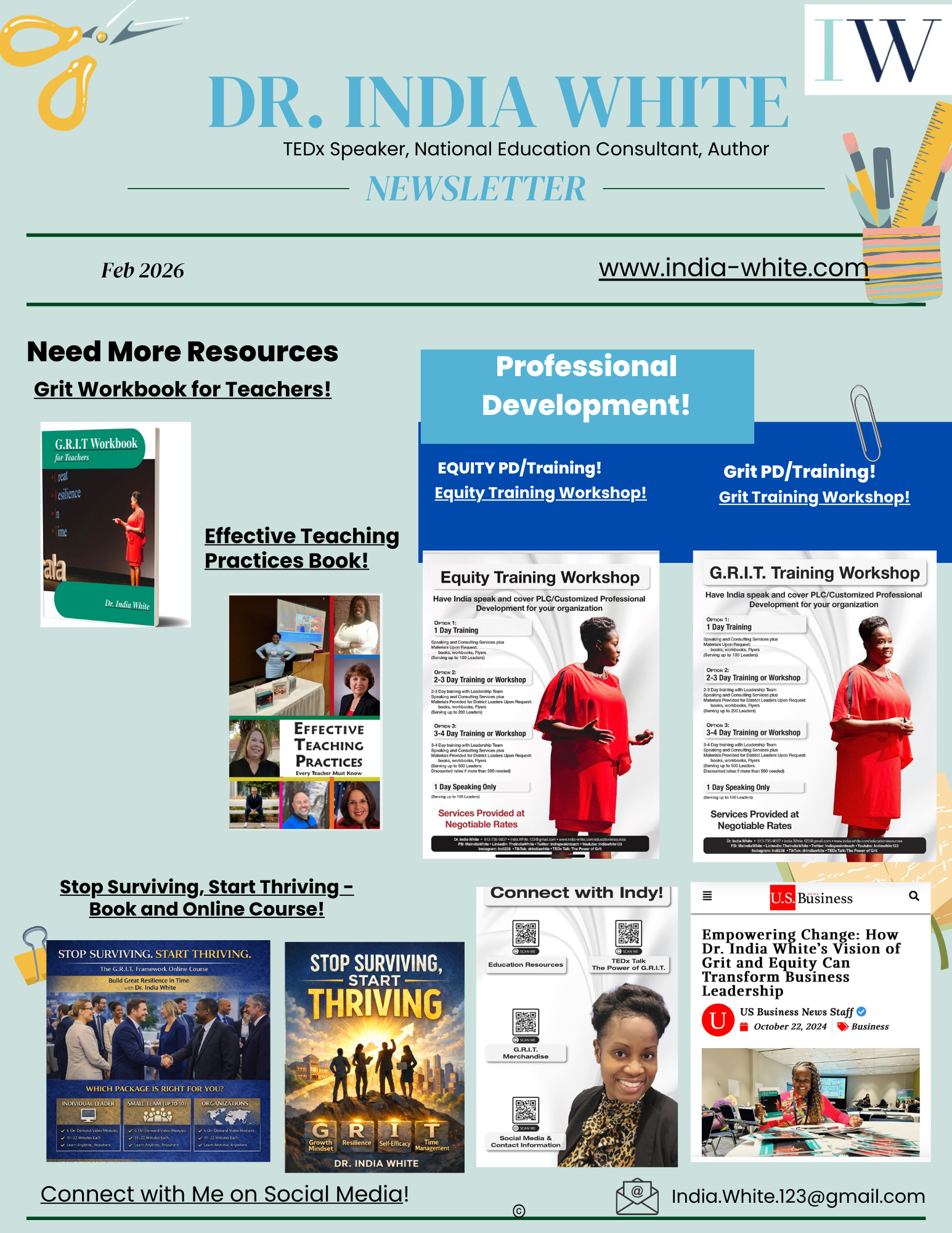
February Energy, Connection, and Celebration—Our Newsletter Is Live! 🎉 I’m so excited to share our February Newsletter, and whew—what a month it has already been! February has been full of learning, laughter, inspiration, and powerful connections, all while we celebrate Black History Month and continue the work of building equity and excellence in education. One of the biggest highlights this month was presenting aUtah Council of Teachers of Mathematics (UCTM)**. Connecting with educators in person in Utah was such a joy. The energy in the rooms, the thoughtful questions, the shared commitment to students—it reminded me why I love this work so much. Teachers showed up curious, gritty, and ready to grow, and I left feeling deeply encouraged. At the same time, I had the opportunity to connect with educators online through Florida Distance Learning Association (FDLA), and let me tell you—virtual spaces can be just as powerful! Engaging with teachers across distances, sharing ideas, and learning together in real time was an absolute blast. Whether in Utah or online, the common thread was clear: educators are hungry for tools that help students thrive. And February isn’t slowing down yet! I’m counting down the days as I prepare to serve as a keynote speaker for the Junior League of Sarasota at the end of the month. I’m truly honored and excited to share space with leaders who are committed to impact, service, and community transformation. This month’s newsletter captures all of that momentum—where I’ve been, what’s coming next, and how we can stay connected. If you haven’t checked it out yet, I invite you to take a look, share it, and reach out. Let’s collaborate, dream big, and keep building together. February is reminding me that connection fuels purpose—and I’m grateful for every educator, leader, and partner walking this journey with me. Let’s keep celebrating, learning, and getting gritty—together. 💛✨
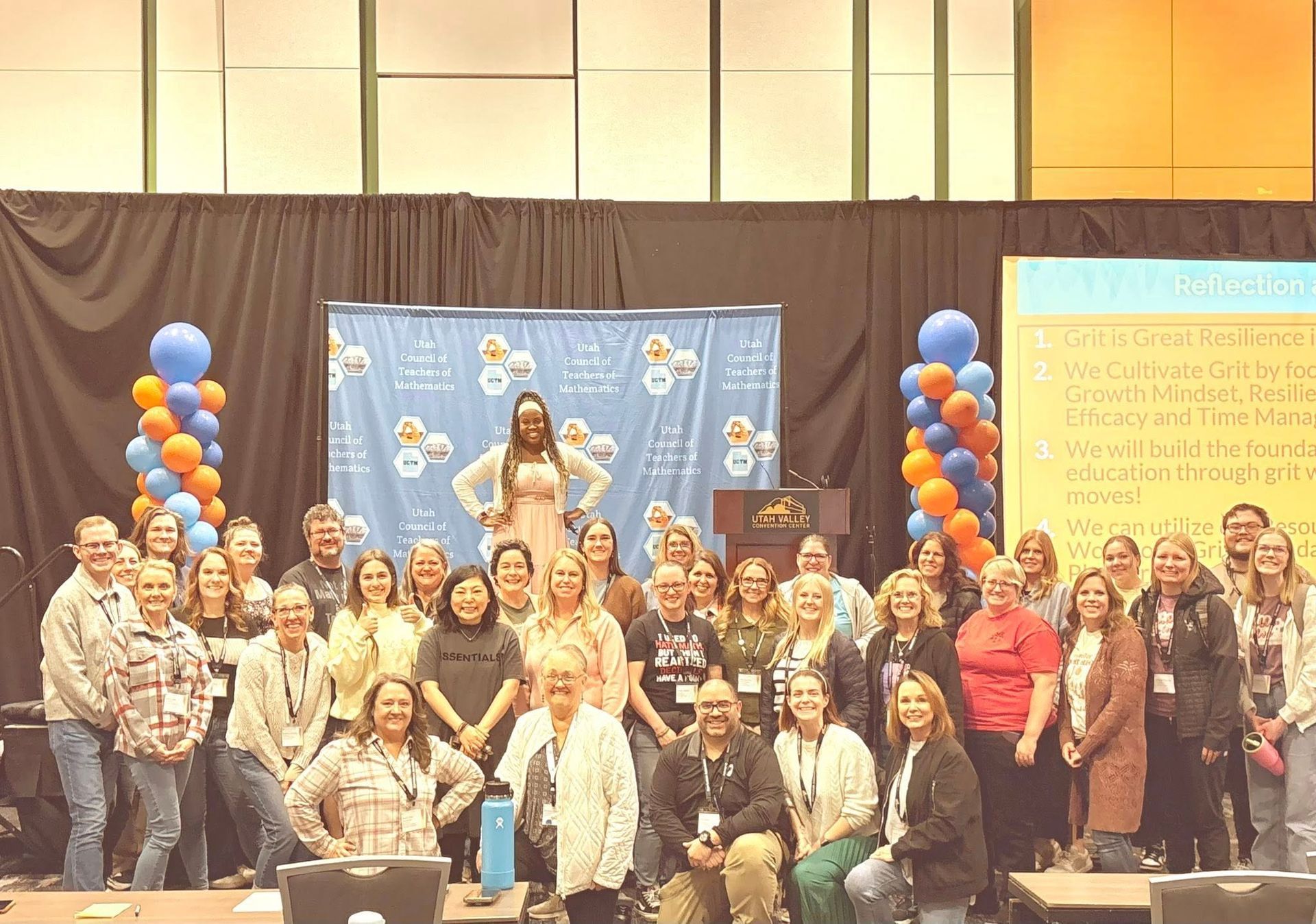
🌟 What an ABSOLUTELY PHENOMENAL time at UCTM presenting on grit games! 🎉 The educators in Utah are truly AMAZING! I feel so blessed to share insights on grit and connect with new friends—cheering each other on to get pumped up again! 💪✨ Had a hilarious time trying to throw hoops with Dan (I only made ONE shot—let’s just say my accuracy needs some work! 😂🏀). It was fantastic to connect with such inspiring friends and leaders in the math community, sharing exciting updates that Savvas has for all the math teachers out there! 📚🔍 BIG shoutout to the UCTM board, Jackie, the Savvas team, and all the incredible Utah educators! Thanks for a blast of a time! 🚀🙌 #GritAndGames #UpliftEducators #MathMagic #ConnectAndInspire #SavvasUpdates #FunInEducation ✨❤️ (I don’t own music copyright)
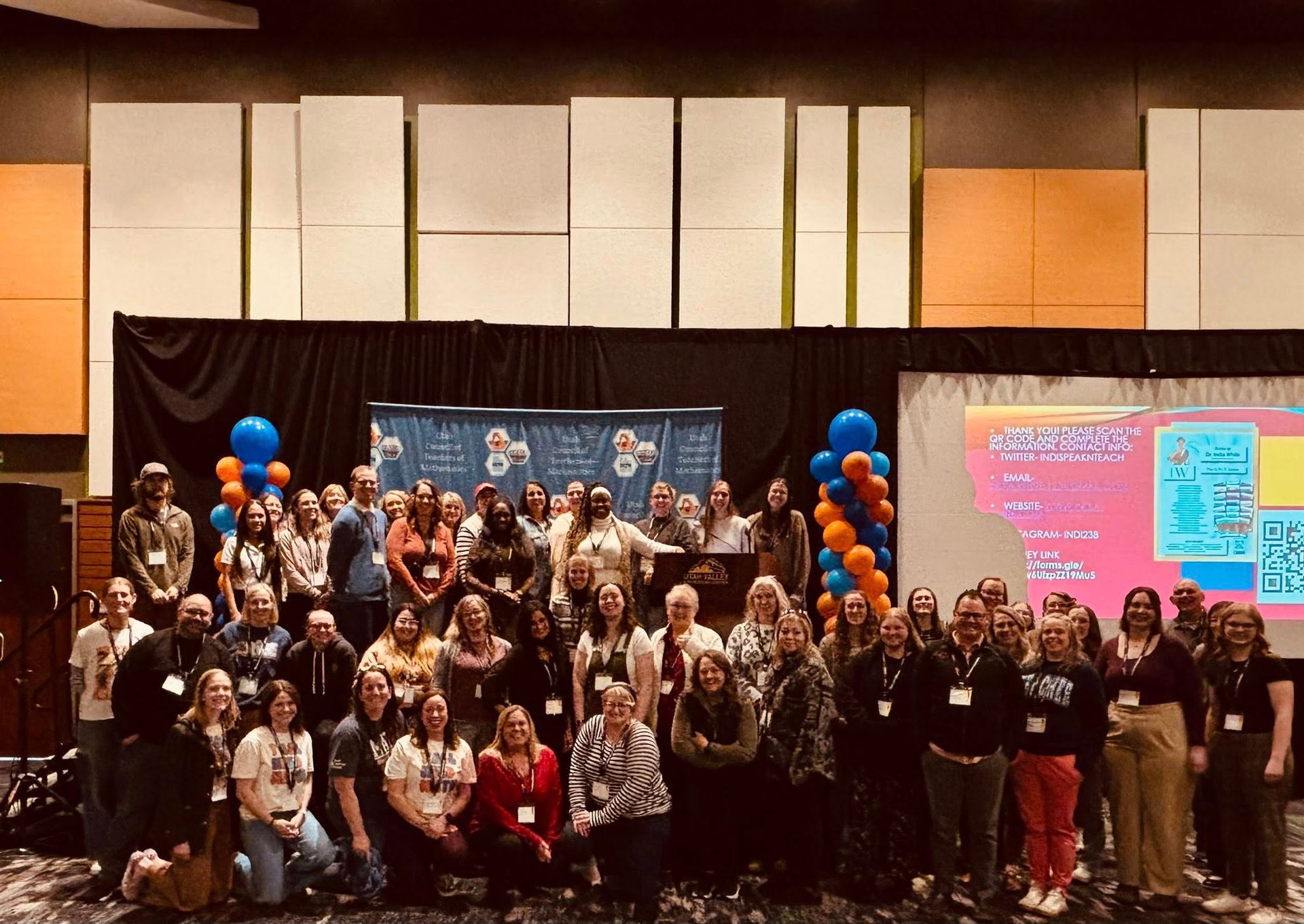
I am incredibly grateful for the opportunity to speak at UCTM 2026. The energy in the rooms was powerful, and several sessions were filled with educators eager to grow, reflect, and strengthen their practice—especially during my session on building gritty thinking in the classroom. Experiences like this remind me why this work matters so deeply. Teachers came ready to engage in meaningful conversations about productive struggle, perseverance, and how to move beyond surface-level engagement into true student thinking. One of the highlights was hearing how excited educators were about the new Savvas math books and the way these resources support conceptual understanding, collaboration, and confidence for learners at all levels. When curriculum, instruction, and mindset align, we truly begin to bridge the gap for students. At the heart of these conversations was the powerful connection between Thinking Classrooms and my G.R.I.T. Framework—Growth Mindset, Resilience, Self-Efficacy, and Time Management. Together, they create learning environments where students don’t just solve problems, they learn how to persist, reflect, and believe in themselves. Building grit starts with a growth mindset. In a thinking classroom, struggle is not a setback—it’s evidence of learning. Teachers can normalize this by celebrating multiple strategies, modeling mistakes, and using language that reframes being “stuck” as part of the thinking process. When students understand that effort and revision are expected, they engage more deeply and take greater ownership of their learning. Resilience grows through collaboration. Thinking classrooms thrive when students work together, share ideas, and wrestle with concepts as a team. Random grouping, structured roles, and intentional math discourse help students learn that perseverance is strengthened in community. When learners support one another, they build confidence and stamina to tackle challenging tasks. Self-efficacy develops when student thinking is valued. Using vertical non-permanent surfaces like whiteboards lowers the fear of making mistakes and encourages risk-taking. Asking students to explain their reasoning and highlighting their ideas—whether complete or still developing—signals that their thinking matters. Over time, students begin to see themselves as capable mathematicians. Time management is another critical component of grit. Teachers can support this by breaking tasks into phases, using visual timers, and guiding students to reflect on how they used their time. These habits help students learn to pace themselves, stay focused, and persist through complex problems—skills that extend far beyond the math classroom. The questions we ask also shape gritty thinking. Instead of rescuing students, we can ask questions that prompt reflection and strategy: What do you already know? What have you tried so far? What could you try next? These questions keep students engaged in the process and strengthen their independence as thinkers. Finally, reflection brings it all together. Ending lessons with opportunities for students to reflect on effort, strategies, and moments of perseverance reinforces that grit is just as important as correctness. When we celebrate persistence as much as achievement, students learn that growth happens over time. UCTM 2026 was a powerful reminder that educators everywhere are committed to creating classrooms where students feel supported, challenged, and empowered. I am grateful for every teacher who showed up ready to learn, collaborate, and push their thinking. Let’s stay gritty, keep learning together, and continue bridging the gap so every learner has the opportunity to thrive.
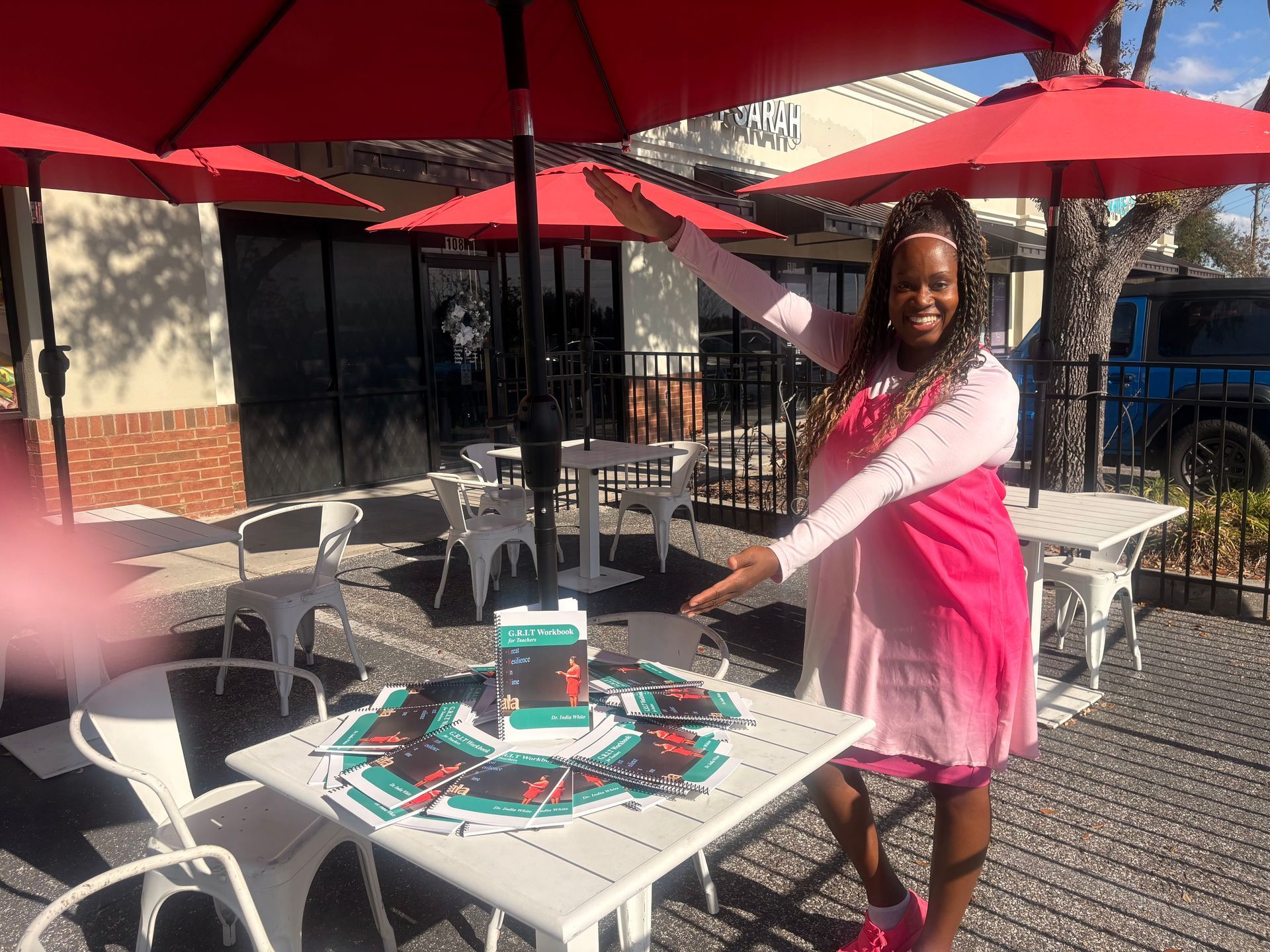
🎉 Exciting news, teachers! 🎓✨ I’m gearing up for an amazing trip to UCTM, and I want YOU to join the fun! Don’t forget to check out my latest video where I reveal some fantastic door prizes that could be yours! 🎁🙌 Let’s connect, learn, and make unforgettable memories together. Click the link and find out how you can win! 🚀💼 👉✨ #UCTM2026 #TeachersRock #drindiawhite #nabse @#foryou (I don’t own copyright to music ) Let’s make this an event to remember! 🙏🎉

It’s Official! The 60-Day Weight Loss & G.R.I.T. Discipline Reset Has Launched 🎉 I’m excited to officially announce the launch of my newest transformational experience—the 60-Day Weight Loss & G.R.I.T. Discipline Reset! This course has been thoughtfully designed for individuals who are ready to stop starting over and finally build the discipline, consistency, and mindset needed to see lasting results. Led by Dr. India White, this 8-week online course goes beyond traditional weight loss programs. It focuses on sustainable change through my proven G.R.I.T. Framework: Growth Mindset, Resilience, Self-Efficacy, and Time Management. This isn’t about extremes or quick fixes—it’s about building habits that fit real life and last well beyond 60 days. What’s Included Participants receive access to: * An introductory video to reset your mindset and set clear expectations * Eight weekly modules that build discipline step by step * A conclusion video to help you transition from a reset to a lifestyle Each week is intentionally structured to help you strengthen both your body and mind, so progress doesn’t disappear once motivation fades. Why This Course Works So many weight loss programs focus only on what to eat or how to exercise—but they ignore the mental discipline required to stay consistent. This course fills that gap. You’ll learn how to: * Stay resilient during setbacks * Manage your time realistically * Build confidence through small, sustainable wins * Create routines that work even on busy days To deepen the experience, I highly encourage participants to pair the course with the 60-Day Weight Loss G.R.I.T. Workbook, available on Amazon. The workbook provides daily reflections, habit tracking, and accountability tools that align with each week of the course. Who This Course Is For This course is perfect for: * Individuals ready to lose weight with structure and purpose * Busy professionals, educators, leaders, and entrepreneurs * Fitness trainers and wellness professionals * Anyone seeking discipline, clarity, and long-term results Enroll Today If you’ve been waiting for the right time to recommit to your health, this is it. The 60-Day Weight Loss & G.R.I.T. Discipline Reset course is now live and ready for you. 👉 Click the link to purchase and enroll today 👉 Start your 60-day reset 👉 Build discipline that lasts a lifetime Your healthiest, most disciplined self is within reach—and G.R.I.T. is the bridge to get you there.
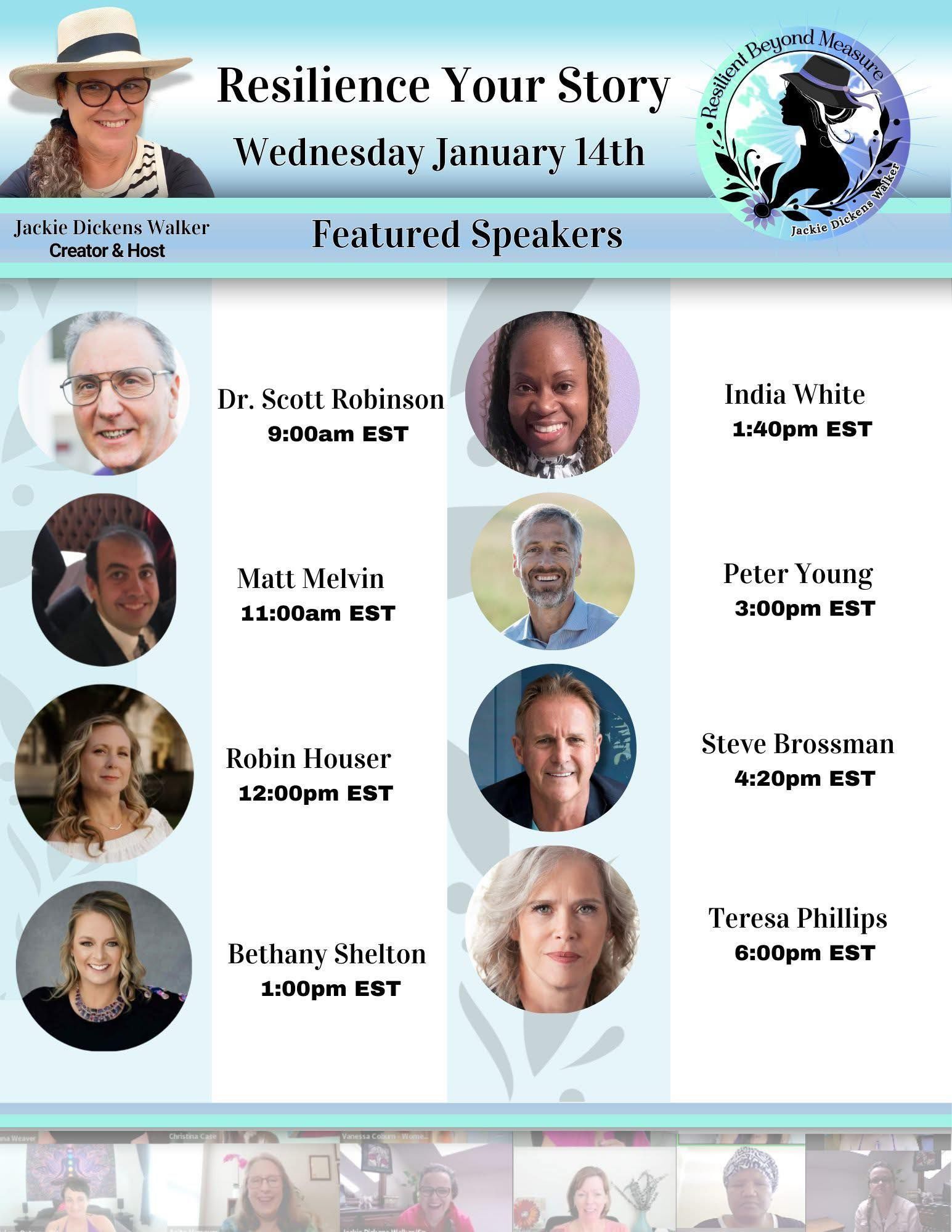
From Homelessness to Hope: Moving from Surviving to Thriving at Resilient Beyond Measure Serving as a keynote speaker at the Resilient Beyond Measure Conference was not only fun, it was deeply meaningful. The room was filled with leaders, educators, and purpose-driven individuals who were hungry for more—more clarity, more impact, and more hope. That collective energy reminded me why I continue to show up and share my story. During my keynote, I spoke candidly about my journey—one that did not begin on a stage, in a boardroom, or with titles behind my name. I shared how I once experienced homelessness, uncertainty, and moments where survival was the only goal. There were seasons when simply making it through the day felt like the win. Yet, through grit, faith, discipline, and relentless perseverance, that season did not define my destination. Today, by God’s grace and years of intentional work, I now serve as a math textbook author, educator, national speaker, and entrepreneur, helping impact millions of students, teachers, leaders, and organizations across the nation. My story is living proof that where you start does not dictate where you finish. At the heart of my keynote was a bold challenge: we must stop normalizing survival mode. Survival is reactive. Thriving is intentional. I shared my G.R.I.T. framework, which continues to be the foundation of my work and message: Growth Mindset — shifting from “I can’t” to “I’m learning” Resilience — developing the stamina to rise again and again Self-Efficacy — believing deeply that you are capable and equipped Time Management — aligning time with purpose, not pressure When these four pillars work together, individuals don’t just cope—they transform. One of the metaphors that resonated strongly with the audience was the idea that many of us are living and leading in low-level energy spaces, when we were designed for more. I described this as moving from survival-level “beta rays” toward higher levels of clarity and impact. Beta represents survival mode —stress-driven, reactive, exhausted, and constantly responding to emergencies. Alpha reflects stability and focus —calmer thinking, reflection, and clearer decision-making. Theta symbolizes creativity and deep connection —innovation, vision, and problem-solving begin to flourish. Gamma represents peak performance and transformation —high-level thinking, purpose, alignment, impact, and legacy. Thriving means intentionally moving away from beta-level survival and stepping into gamma-level living and leadership—where our actions are aligned with purpose, vision, and long-term impact. I want to extend my sincere thanks to Jackie Walker for the invitation and opportunity to keynote such a powerful conference. Resilient Beyond Measure created a space where authenticity, healing, and growth were not just encouraged—they were activated. It was truly an honor to serve and connect with such an inspiring community. I was also excited to share my newest book, Stop Surviving, Start Thriving, which expands on the message of the keynote and provides practical tools to help readers move from burnout to breakthrough. The book is accompanied by a new course designed to walk participants step by step through applying the G.R.I.T. framework in real life—not just reading about it, but living it. In addition, leaders are invited to explore the G.R.I.T. Workbook for Leaders, created to support sustainable leadership, confidence, resilience, and intentional growth. If this message resonates with you, I would love to stay connected. Visit my website at www.india-white.com to learn more about my work, speaking engagements, and resources. Both Stop Surviving, Start Thriving and the G.R.I.T. Workbook for Leaders are available today! Whether you are an educator, leader, entrepreneur, or someone simply ready for more, remember this: you were never meant to just survive. With grit, vision, and intention, thriving is not only possible—it’s your calling. With gratitude and grit, Dr. India White
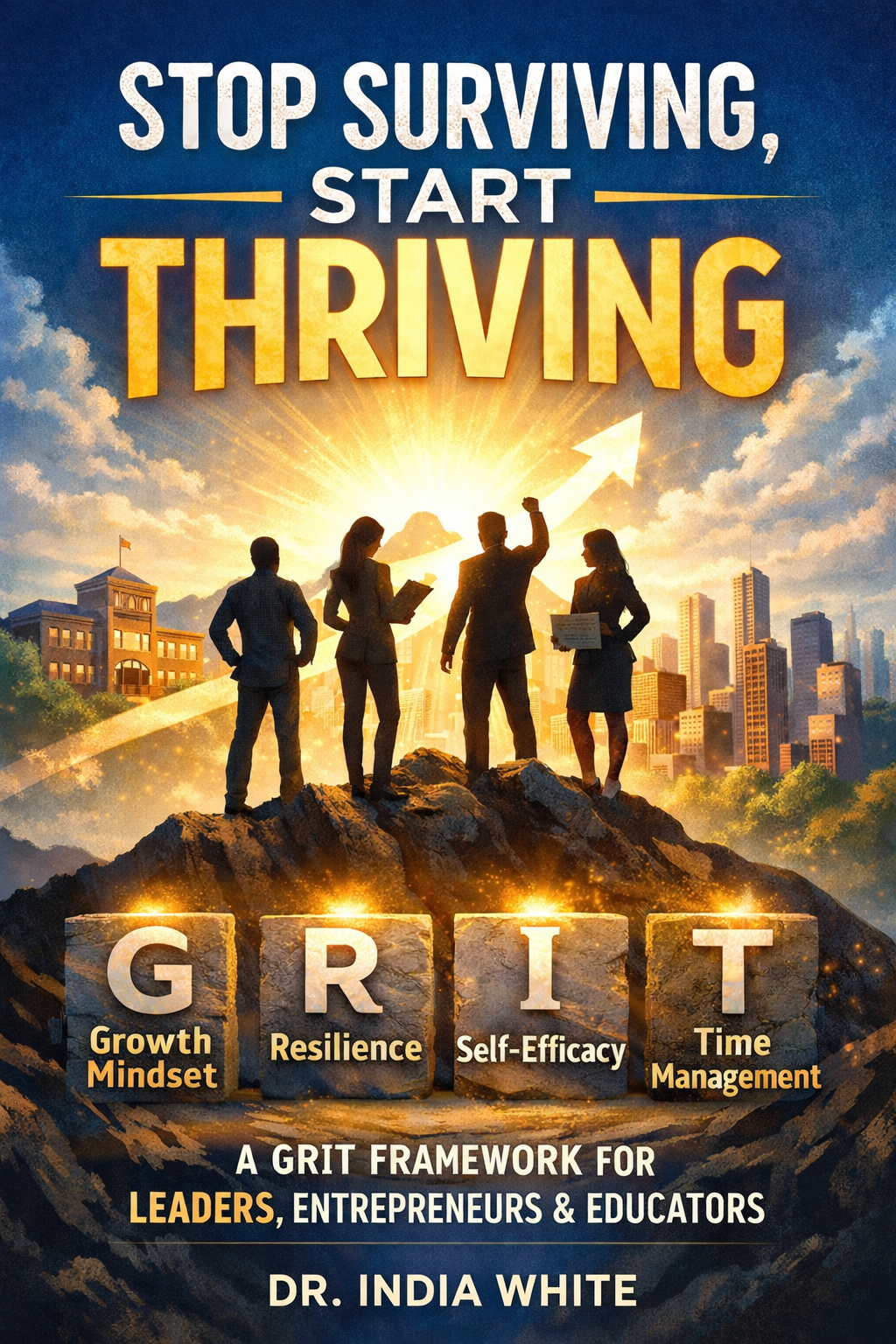
EXCITING NEWS!! I am thrilled to share some incredible news with you all! After months of hard work and dedication, I am proud to announce the launch of my new book, "Stop Surviving, Start Thriving: A Grit Framework for Leaders." This book is designed to empower leaders like you with the insights and strategies needed to elevate your leadership journey and truly thrive in today’s challenging environment. What You’ll Discover in My Book In "Stop Surviving, Start Thriving," I delve into the grit framework that will help you harness your strengths, overcome obstacles, and lead with confidence. Whether you’re an established leader or someone just starting your journey, this book is filled with practical advice and actionable steps to make a meaningful impact. Why This Book Matters: - Transformational Insights: Learn how to shift your mindset from merely surviving to genuinely thriving in your role. - Practical Strategies: Gain access to tools and techniques that you can implement right away to enhance your leadership effectiveness. - Inspiration: Discover stories and examples that will motivate you to take your leadership to the next level. Introducing the Stop Surviving, Start Thriving Course! In addition to the book, I am thrilled to announce the launch of the Stop Surviving, Start Thriving Course! This course complements the book perfectly, providing you with an interactive experience to dive deeper into the concepts covered and gain practical tools that you can use in your daily leadership practice. What to Expect from the Course: - Interactive Learning: Engaging modules that challenge you to think critically and apply lessons to your leadership style. - Real-Life Applications: Practical exercises and discussions that make the concepts relatable and actionable. - Community Support: Join a network of like-minded individuals who are also on their journey to thrive! Where to Find the Book and Course You can grab your copy of "Stop Surviving, Start Thriving" on Amazon by following this link: Amazon Link ( https://a.co/d/c8BNlS9 ). 📖 For those eager to join the course, it's available on my website here: Stop Surviving, Start Thriving Course ( https://www.india-white.com/store/Stop-Surviving-Stop-Thriving-Online-Course-p657410057 ). 🌐 Join Me on This Transformative Journey! I am so excited about this new chapter and can’t wait for you to explore the book and course. Together, let’s stop surviving and start thriving! Your leadership journey begins now. Thank you for your continued support, and I look forward to hearing your thoughts on the book and the course! Let’s thrive together! 💥

